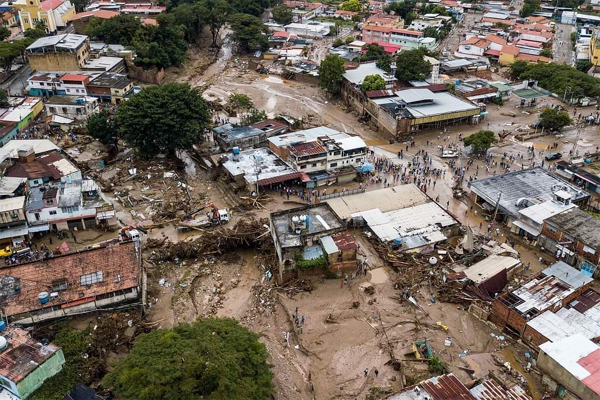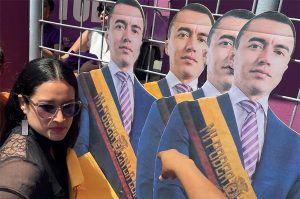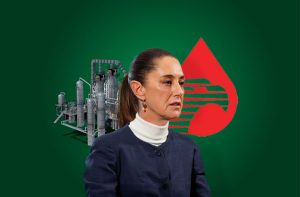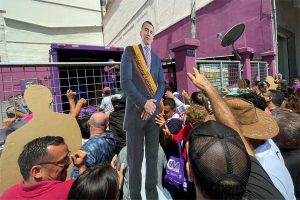
Tropical Storm Julia, which made landfall in Nicaragua on Sunday, has battered Central America over the last two days. The storm has killed 25 people since it landed, in addition to forcing thousands of evacuations and leaving many without power across the region, reports Reuters. The storm has since weakened but is expected to bring heavy rainfall to Guatemala and southern Mexico as it heads north.
In Venezuela, at least 36 people have been killed and 56 remain missing in the town of Las Tejerias, Aragua following intense floods, reports Reuters. Nicolás Maduro made a surprise visit to the town, documented on Twitter, as part of the response to the disaster.
These environmental disasters join Hurricanes Fiona and Ian from last month (see LADBs from 9/20/22 and 9/28/22), significantly affecting the region’s already weak infrastructure, as climate change continues to strengthen tropical storms and other environmental disasters.

Argentina
- Following the resignation of Argentina’s Labor, Social, and Women’s Ministries, three women were named to fill those positions, increasing the number of women in President Alberto Fernández’s Cabinet, says Reuters.
Brazil
- The Ministry of Defense has kept mum about its parallel vote audit following the first round of the presidential elections, reports Folha.
Chile
- Following the failure to approve the constitutional referendum which would have granted more rights and autonomy to Chile’s Indigenous communities, “extremist Mapuche groups in the south of the country are increasing the intensity of their attacks,” says Bloomberg.
Colombia
- Last Sunday, the city of Buenaventura saw the beginning of a truce between Los Shotas and Los Espartanos, two of the city’s largest criminal groups, offering a glimpse into the potential of Gustavo Petro’s “Total Peace” plan, according to Pirate Wire Services.
- “Drug traffickers and criminal gangs involved in cocaine production and trafficking could receive benefits such as reduced prison sentences for submitting themselves to justice, sharing details about trafficking routes, and turning over their fortunes,” writes Reuters, explaining how Petro’s “Total Peace” plan includes an offensive against drug traffickers and illegal armed gangs.
Haiti
- Increasing gang violence in Haiti, in addition to the country’s scarcity of food, water, and basic supplies, has caused the UN Security Council on Monday to deliberate the deployment of foreign troops to help alleviate the conflict, according to AP.
Mexico
- Foreign Minister Marcelo Ebrard announced that Mexico submitted a new lawsuit against five arms businesses in Arizona, in the country’s latest effort to tamp down on the number of arms available to criminal groups, says La Política Online.
- The mayor of the State of Mexico and municipal president of Ecatzingo, Rebeca Pérez Martínez, had her WhatsApp hacked in a case of identity theft, according to Infobae.
Peru
- The Institute for Democracy and Electoral Assistance (IDEA) analyzed the outcomes of Peru’s October 2 regional and municipal elections, highlighting the strength of political parties and regional movements at different levels of government.
Puerto Rico
- Foreign Policy explores food sovereignty in Puerto Rico, with the island dependent on food imports, writing that mushrooms “could be the secret ingredient to the island’s food sovereignty.”
Regional
- “The leaks obtained by the Guacamaya collective from various servers belonging to the armed forces in different countries in the region have revealed monitoring of the activities of civil society organizations, including Amnesty International, by the military in Mexico and Peru so far, showing the deterioration of respect for human rights,” says Amnesty International.
Uruguay
- A bill that would legalize euthanasia passed Uruguay’s Lower House last Thursday with 57 out of 96 votes, according to MercoPress. The bill will now head to the country’s Senate.
Venezuela
- “Since 2016, when the Mining Arc came to be, (Venezuela) has lost as much forest land as it had in the previous fifteen years: an area three times the size of the Greater Caracas. The causes: shifting cultivation, forest fires, and mining,” explains Caracas Chronicles.
- “Venezuelan President Nicolas Maduro is asking the International Monetary Fund’s members to restore recognition of his government, which would put it a step closer to accessing billions of dollars in reserves,” says Bloomberg, with the outlet also noting that “a hedge fund manager who correctly timed the crash of the US housing market and a crypto currency rally eight years ago thinks he’s found his next overlooked investment: Venezuelan debt.”
Arianna Kohan y Jordi Amaral / Latin America Daily Briefing
http://latinamericadailybriefing.blogspot












